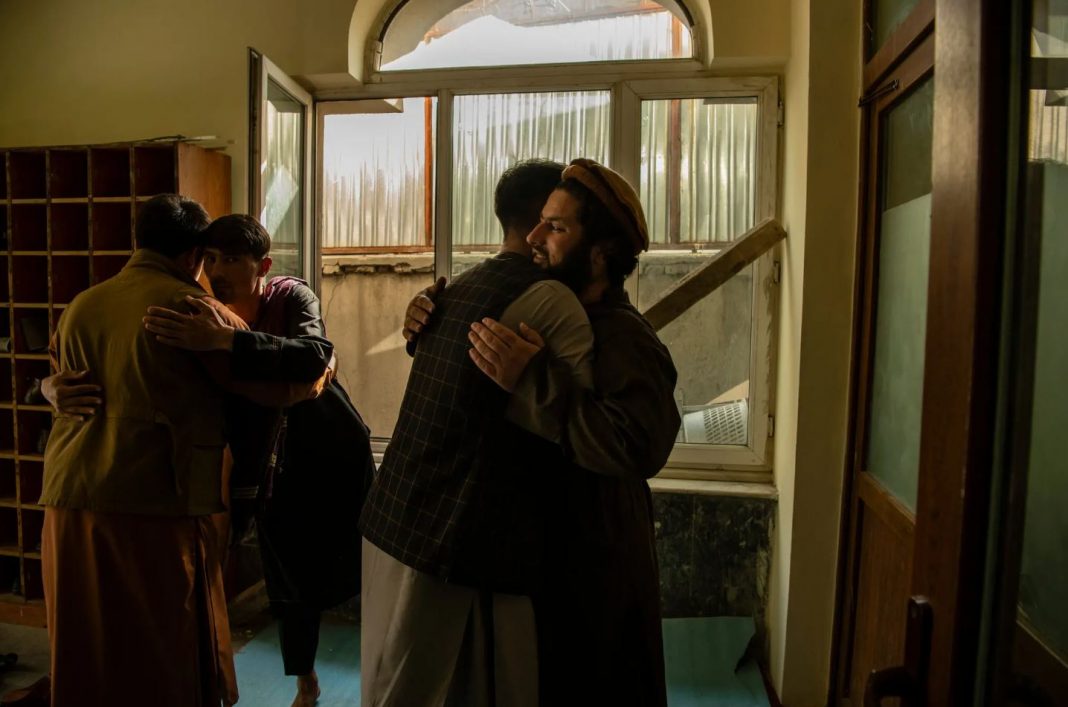Thousands of Afghans had loaded onto buses and headed off through the country’s once-dangerous routes, hoping to catch up with family they had not seen in months or years. When violence raged throughout Afghanistan, the country’s lone national park was swarming with visitors who had only dreamt of seeing the area’s vividly blue lakes and rugged mountains when it was closed to the public.
And Zulhijjah Mirzadah, a mother of five, packed a tiny picnic of dry fruit, piled into a minibus, and drove for two hours through the crowded streets of Kabul to a lively amusement park, where she met up with her friends.
She could hear the low whoosh of a roller coaster and the chorus of joyful shouts from Afghans inside the park, who were celebrating Eid al-Fitr, the festival marking the end of the holy month of Ramadan, as she approached the entrance. On Eid, she was informed at the entrance that women were not permitted to access the park due to Taliban restrictions.
The relentless and random bloodshed of Afghanistan’s past two decades of conflict had many Afghans hoping that when peace finally arrived to the nation, Eid al-Fitr would be the high point of the celebration, a day on which family who had been separated by battle would finally be able to reunite.
That conflict is now officially done. People may drive freely along highways without fear of being targeted by gunfire, roadside explosives, or extortion attempts. The ominous drone of jets above has long since faded away. However, for many Afghans, the holiday that started last Sunday served as a reminder of the dissonance that exists between the promise of peace that many Afghans had envisaged and the reality of the end of the war in their country.
A terrible economic crisis that has reduced earnings and driven the cost of essential products rising has led many families to forego the Eid traditions of buying new garments or dried fruit for the first time in recent history. Because of a recent succession of explosions that raised worries of a renewed wave of terrorist strikes, mosques were noticeably more deserted than normal.
There was also little cause to rejoice for many women in urban areas, who have been devastated by the Taliban government’s limitations. Taliban officials declared on Saturday that Afghan women must dress in full-body coverings, adding to a long list of onerous restrictions on women that govern practically every aspect of public life in the country.
Only approximately 50 worshippers showed up for prayers on Sunday morning at the Seyyed Abad Mosque, the country’s biggest Shiite mosque in the northern city of Kunduz, according to those who attended. In previous years, the mosque had had 400 to 500 pilgrims, according to those who attended. Many individuals stayed away from the mosque entirely, fearful of being targeted by another bomb. However, many of those who came were driven by a different concern: the fear of defying the Taliban government’s decision that Eid would begin on Sunday instead of Saturday.
Many Afghan Shiites questioned the timing of the attack, which occurred a day before Saudi Arabia and two days before Iran, which is a Shiite theocracy. The Taliban has used police-state measures to preserve order since capturing control, so many people attended Eid prayers on Sunday, despite the fact that they were still fasting from dawn to dusk and refraining from hosting parties at their residences.
Since joining the Taliban when he was 15 years old, Mohibullah Mushfiq, now 26 years old, has spent every Eid on mountainsides and dusty villages far away from his family. His family, however, was forced to relocate from their hamlet in the east to a third-floor flat in Kabul when the Taliban gained control.
This year, on the first morning of Eid, he shared sweets with his four-year-old son and two-year-old daughter, who were both giddy with excitement at the thought of spending the holiday in the large metropolis for the first time. He was overjoyed when his government announced the start of Eid, and he expressed his gratitude by saying, “I am proud of my country.”
Ubaidullah Edris, a 21-year-old man standing nearby in the parking lot, spoke softly into his phone. Her son’s mother begged him to come back home to their hamlet in Wardak, a hilly district southwest of Kabul, to spend Eid with her and his siblings.
He said that talking to her made him homesick. Mr. Edris had spent every Eid in his village, climbing up a hillside with his friends to roast a goat or a sheep, for the majority of his life. Nevertheless, after hanging up the phone, his longing for home was swiftly overwhelmed by a strong feeling of responsibility that he felt while remaining on patrol in Kabul.
According to park administrators, the number of visitors to City Park, Kabul’s amusement park, and the city’s zoo was less than half of the usual number of visitors during Eid. In addition to the country’s economic collapse, the poor attendance was a result of the Taliban’s decree prohibiting women from visiting on Eid, which is the latest in a growing list of restrictions on women in public settings.
On the second day of Eid, Zhilla, 18, gathered with her family at her aunt’s home, which was located in a humble house hidden into one of Kabul’s numerous hillside neighbourhoods. In the little courtyard, her young relatives and brothers were chasing after each other. Internally, Zhilla was awestruck by her new cousin, who was just six days old and resting quietly on her mother’s lap.
Last year, she and her family had gathered outside the city’s Qargha reservoir to have lunch by the river as children rode bicycles along its banks and paddled boats out on the lake – a memory that she said seemed like it happened a lifetime ago.

